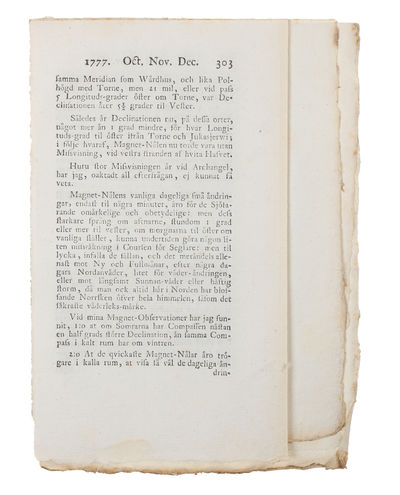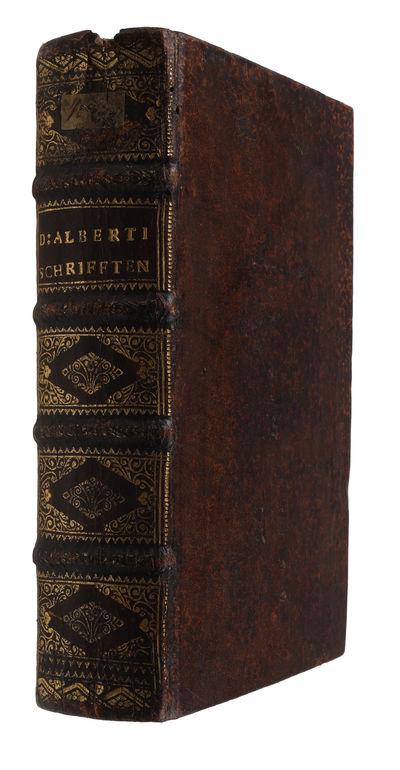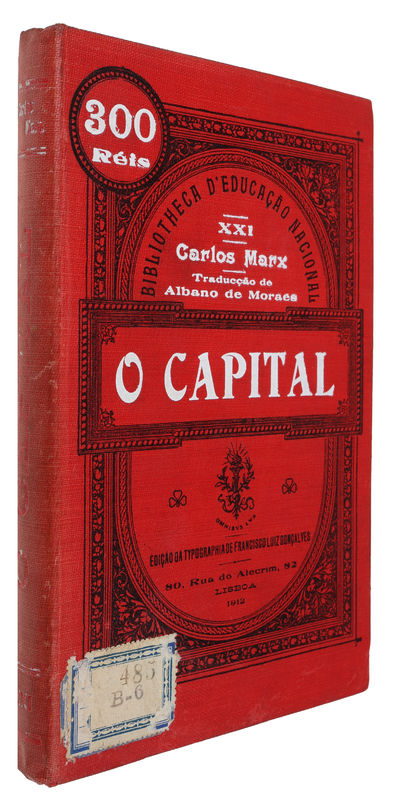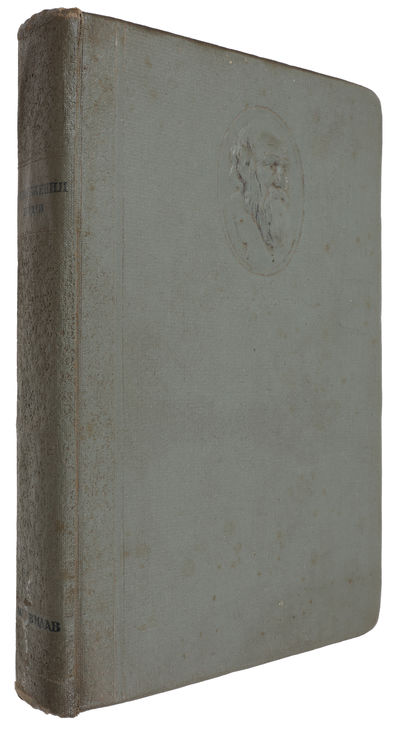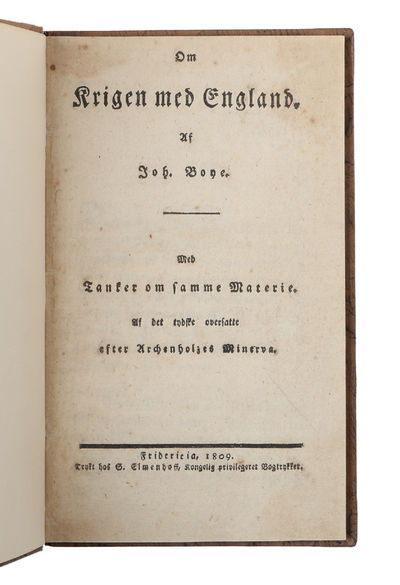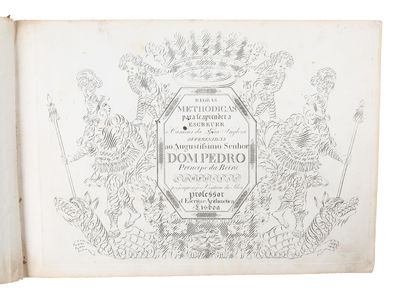MACHIAVELLI, NICCOLO.
Le Prince. Traduit d'Italien en Francoys Par Guillaume Cappel. - [THE BIRTH OF MODERN POLITICAL THOUGHT]
Herman H. J. Lynge & Søn A/S
lyn57045
Paris, Charles Estienne, 1553. Small 4to. Bound in a lovely 19th century red morocco binding with five raised bands and gilt ornamentations to spine. Boards with blindstamped frame-borders and gilt ornamental centre-pieces. All edges of boards gilt and inner gilt dentelles. All edges gilt. "E. THOMAS" discreetly printed to top of front free end-paper. Front free end-paper with woodcut armorial book-plate (Bibliotheque du Plessis Villoutreys). First and last leaves with a bit of brownspotting, otherwise very nice and clean throughout. The last three leaves with neat restorations - neatly closed tear, with no loss and a couple of small restorations to top margin (far from affecting text). (8), 148 pp. Estienne's printer's device to title-page and woodcut initials.
The extremely rare first translation printed in any language, being the first printed French translation, of one of the most important and influential works in the history of mankind, Machiavelli's "The Prince". After the original printing in Italian, the present is arguably the most desirable edition of the seminal masterpiece that is Machiavelli's magnum opus. "The Prince" constitutes the beginning of modern political philosophy and one of the most influential works in the history of modern thought. It founded the science of modern politics on the study of mankind, and even today no political thinker can disregard the importance of this masterpiece of political theory.The translation not only inaugurated the tradition of translating "The Prince" into other languages than Italian, it also exercised the greatest influence upon the entire Machiavellian tradition and constitutes an immeasurable historical source in its own right. Although the work was never reprinted and this extremely scarce edition is the only available version of the text, the effects of it are still clearly visible in our times. It secured the diffusion of the text throughout Europe and it served as the basis for the most important of the later translations, e.g. Jacques Gohory's from 1571, which is considered not much more than a slight reworking of Cappel's translation. As Jean Bingen points to, Cappel's translation also directly influenced (and influences) almost all modern translations of the work. The reason for this continued direct and strong influence is of course not only due to its priority in time over all other translations, it is also due to the fact that Cappel's translation always has been and still is considered the most "Machiavellian" translation of "The Prince" ever made and the one closest to the source - both in time, in style, and in rendering of the content. Cappel was the only of the early translators who was himself a Machiavellian and his respect for and understanding of the text shines from the pages. "Besides being a politically charged text, the "Principe" was also a piece of beautiful and clear Italian prose, and its tightness and brevity constituted a decisive advantage over the "Discorsi". An awareness of the literary qualities of the text is also evident in the preface Guillaume Cappel wrote to his translation (dedicated to Jean Bertrand, Lord Privy Seal), in which he underlines Machiavelli's use of an appropriate style and the good use to which he puts his knowledge of history... These qualities prompted Cappel to undertake his translation...Cappel's enterprise was praised for his literary qualities by the members of the Pléiade who had their own poems inserted at the end of the translation. More recently, his version had been justly praised as "very literal and sinewy". It has also been noted, however, that it was not reprinted, thought Jacques Gohery's version, published 1571, followed it "almost verbatim"." (Petrina, Machiavelli in the British Isles, p. 12). "Guillaume Cappel II, sieur de Preigny (1530-86), was widely known in medicine for his work on nutrition and his editing of texts on how to avoid the plague and on general medical diagnosis. A member of the Catholic League, he was determined not only to bring up his brother's children in the Catholic faith but also to exploit Tilloy to his own profit. However, in 1586 he was killed in an affray with the enemies of the League... Family divisions of the kind that occurred at Le Tilloy were customary during the religious wars, but it is not because of his part in them, nor even because of his Catholic enthusiasm and his medical reputation, that Guillaume Cappel deserves attention. In 1553, at the age of twenty-three, he published a French translation of Machiavelli's "Prince", dedicating it to a powerful patron, the "Garde des sceaux" Jean Bertrand. Appended to the book were poems praising Mchiavelli, and Cappel as his French interpreter, by Marc-Antoine Muret and Rémy Belleau, and other verses about the relative merits of French and Italian princes by Etienne Jodelle. Guillaume Cappel clearly mixed in the foremost literary circles of the time. He claimed to be a student of politics, as well as of medicine and letters, and in his dedication to Bertrand, which he modelled on Machiavelli's own prefatory letter to Lorenzo de' Medici, he expressed an admiration for Machiavelli that knew no bounds. Politics, he remarked, constituted the highest branch of philosophy, itself the queen of the "sciences". Other political writers were sophists producing utopias, but Machiavelli wrote of government as it really was. Cappel went on to argue in his preface that men were more ungrateful towrads their ruler than any animal towrads its master. The exercise of power was shaped by necessity, not by virtuous intentions, and only those who understood this could govern successfully. For his part, the ruler necessarily pursued two aims, to keep his authority intact and to extend his dominions. According to Cappel, Machiavelli had boldly analysed the faults committed by princes in the pst, had shown how problems could be dealt with in the future, and had brilliantly explained the causes of political upheavals.Guillaume Cappel's translation of "The Prince" was the first of three to be published in France before the massacre of St. Bartholomew, when the black legend of Machiavelli became dominant... Guillaume Cappel was not only the first translator of "The Prince" but also the one most in sympathy with Machiavelli himself. He scornfully refuted those who accused his author "de facooner un prince trop rigoreux." A good doctor, said Cappel in his dedication, did not worry whether his patient disliked the remedy he prescribed, but merely whether the cure would work. Cappel refused to take up the rumor whether Machiavelli was an atheist, because, he claimed, there was nothing he had written that could support or deny the charge... Cappel's translation was sharper, and truer to the original than Gaspard d'Auvergne's or Gohory's.... The young Guillaume Cappel was, at this time at least, a true Machiavellian." (McMillan Salmo, Renaissance and Revolt, pp. 62-63). The work is of the utmost scarcity, with only few copies known. According to the "Catalogue général" of the Bibliothèque National, at least thirty-five editions of three French translations of "The Prince" appeared between 1553 and 1664. "The doctor Guillaume Cappel is credited with the first French translation of "The Prince" (1553), followed by Gaspard d'Auvergne (1553) and Jacques Gohory (1571)." (Jacob Soll, Publishing The Prince, p.73).(See PMM 63 - first edition).
The extremely rare first translation printed in any language, being the first printed French translation, of one of the most important and influential works in the history of mankind, Machiavelli's "The Prince". After the original printing in Italian, the present is arguably the most desirable edition of the seminal masterpiece that is Machiavelli's magnum opus. "The Prince" constitutes the beginning of modern political philosophy and one of the most influential works in the history of modern thought. It founded the science of modern politics on the study of mankind, and even today no political thinker can disregard the importance of this masterpiece of political theory.The translation not only inaugurated the tradition of translating "The Prince" into other languages than Italian, it also exercised the greatest influence upon the entire Machiavellian tradition and constitutes an immeasurable historical source in its own right. Although the work was never reprinted and this extremely scarce edition is the only available version of the text, the effects of it are still clearly visible in our times. It secured the diffusion of the text throughout Europe and it served as the basis for the most important of the later translations, e.g. Jacques Gohory's from 1571, which is considered not much more than a slight reworking of Cappel's translation. As Jean Bingen points to, Cappel's translation also directly influenced (and influences) almost all modern translations of the work. The reason for this continued direct and strong influence is of course not only due to its priority in time over all other translations, it is also due to the fact that Cappel's translation always has been and still is considered the most "Machiavellian" translation of "The Prince" ever made and the one closest to the source - both in time, in style, and in rendering of the content. Cappel was the only of the early translators who was himself a Machiavellian and his respect for and understanding of the text shines from the pages. "Besides being a politically charged text, the "Principe" was also a piece of beautiful and clear Italian prose, and its tightness and brevity constituted a decisive advantage over the "Discorsi". An awareness of the literary qualities of the text is also evident in the preface Guillaume Cappel wrote to his translation (dedicated to Jean Bertrand, Lord Privy Seal), in which he underlines Machiavelli's use of an appropriate style and the good use to which he puts his knowledge of history... These qualities prompted Cappel to undertake his translation...Cappel's enterprise was praised for his literary qualities by the members of the Pléiade who had their own poems inserted at the end of the translation. More recently, his version had been justly praised as "very literal and sinewy". It has also been noted, however, that it was not reprinted, thought Jacques Gohery's version, published 1571, followed it "almost verbatim"." (Petrina, Machiavelli in the British Isles, p. 12). "Guillaume Cappel II, sieur de Preigny (1530-86), was widely known in medicine for his work on nutrition and his editing of texts on how to avoid the plague and on general medical diagnosis. A member of the Catholic League, he was determined not only to bring up his brother's children in the Catholic faith but also to exploit Tilloy to his own profit. However, in 1586 he was killed in an affray with the enemies of the League... Family divisions of the kind that occurred at Le Tilloy were customary during the religious wars, but it is not because of his part in them, nor even because of his Catholic enthusiasm and his medical reputation, that Guillaume Cappel deserves attention. In 1553, at the age of twenty-three, he published a French translation of Machiavelli's "Prince", dedicating it to a powerful patron, the "Garde des sceaux" Jean Bertrand. Appended to the book were poems praising Mchiavelli, and Cappel as his French interpreter, by Marc-Antoine Muret and Rémy Belleau, and other verses about the relative merits of French and Italian princes by Etienne Jodelle. Guillaume Cappel clearly mixed in the foremost literary circles of the time. He claimed to be a student of politics, as well as of medicine and letters, and in his dedication to Bertrand, which he modelled on Machiavelli's own prefatory letter to Lorenzo de' Medici, he expressed an admiration for Machiavelli that knew no bounds. Politics, he remarked, constituted the highest branch of philosophy, itself the queen of the "sciences". Other political writers were sophists producing utopias, but Machiavelli wrote of government as it really was. Cappel went on to argue in his preface that men were more ungrateful towrads their ruler than any animal towrads its master. The exercise of power was shaped by necessity, not by virtuous intentions, and only those who understood this could govern successfully. For his part, the ruler necessarily pursued two aims, to keep his authority intact and to extend his dominions. According to Cappel, Machiavelli had boldly analysed the faults committed by princes in the pst, had shown how problems could be dealt with in the future, and had brilliantly explained the causes of political upheavals.Guillaume Cappel's translation of "The Prince" was the first of three to be published in France before the massacre of St. Bartholomew, when the black legend of Machiavelli became dominant... Guillaume Cappel was not only the first translator of "The Prince" but also the one most in sympathy with Machiavelli himself. He scornfully refuted those who accused his author "de facooner un prince trop rigoreux." A good doctor, said Cappel in his dedication, did not worry whether his patient disliked the remedy he prescribed, but merely whether the cure would work. Cappel refused to take up the rumor whether Machiavelli was an atheist, because, he claimed, there was nothing he had written that could support or deny the charge... Cappel's translation was sharper, and truer to the original than Gaspard d'Auvergne's or Gohory's.... The young Guillaume Cappel was, at this time at least, a true Machiavellian." (McMillan Salmo, Renaissance and Revolt, pp. 62-63). The work is of the utmost scarcity, with only few copies known. According to the "Catalogue général" of the Bibliothèque National, at least thirty-five editions of three French translations of "The Prince" appeared between 1553 and 1664. "The doctor Guillaume Cappel is credited with the first French translation of "The Prince" (1553), followed by Gaspard d'Auvergne (1553) and Jacques Gohory (1571)." (Jacob Soll, Publishing The Prince, p.73).(See PMM 63 - first edition).
Adresse:
Silkegade 11
DK-1113 Copenhagen Denmark
Telefon:
CVR/VAT:
DK 16 89 50 16
E-post:
Nettsted:
![Le Prince. Traduit d'Italien en Francoys Par Guillaume Cappel. - [THE BIRTH OF MODERN POLITICAL THOUGHT] (photo 1)](https://d3525k1ryd2155.cloudfront.net/h/280/858/1240858280.0.l.jpg)
![Le Prince. Traduit d'Italien en Francoys Par Guillaume Cappel. - [THE BIRTH OF MODERN POLITICAL THOUGHT] (photo 2)](https://d3525k1ryd2155.cloudfront.net/h/280/858/1240858280.1.l.0.jpg)
![Le Prince. Traduit d'Italien en Francoys Par Guillaume Cappel. - [THE BIRTH OF MODERN POLITICAL THOUGHT] (photo 3)](https://d3525k1ryd2155.cloudfront.net/h/280/858/1240858280.2.l.0.jpg)
![Le Prince. Traduit d'Italien en Francoys Par Guillaume Cappel. - [THE BIRTH OF MODERN POLITICAL THOUGHT] (photo 4)](https://d3525k1ryd2155.cloudfront.net/h/280/858/1240858280.3.l.0.jpg)
![Le Prince. Traduit d'Italien en Francoys Par Guillaume Cappel. - [THE BIRTH OF MODERN POLITICAL THOUGHT] (photo 5)](https://d3525k1ryd2155.cloudfront.net/h/280/858/1240858280.4.l.0.jpg)
![Le Prince. Traduit d'Italien en Francoys Par Guillaume Cappel. - [THE BIRTH OF MODERN POLITICAL THOUGHT] (photo 6)](https://d3525k1ryd2155.cloudfront.net/h/280/858/1240858280.5.l.0.jpg)
